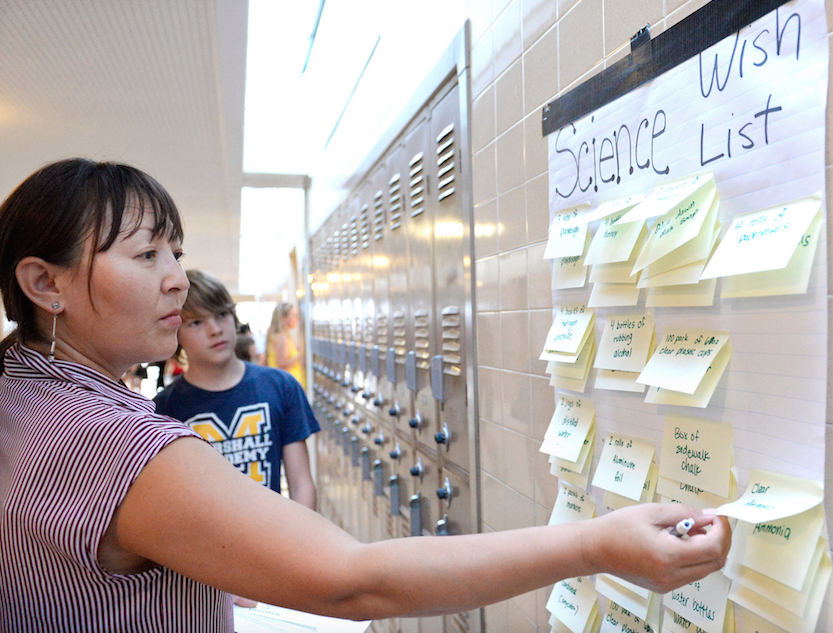
Black teachers: How to recruit them and make them stay

Lessons in higher education: What California can learn

Keeping California public university options open

Superintendents: Well-paid and walking away

The debt to degree connection

College in prison: How earning a degree can lead to a new life

California this week officially kicked off its first attempt at a statewide education data system to provide trend information to help students and families with college and career planning.
The board of the Cradle-to-Career system — composed of 21 legislators, education leaders and advocates — met for the first time Tuesday and took key steps to launch the long-sought program, including appointing Amy Fong as its chairwoman.
Fong is the chief operations officer for California School Information Services, which runs the state’s K-12 data system for the California Department of Education. The board also selected an executive director from among three finalists. Members will hold a special meeting in about two weeks to make the hire.
Although completion is years down the line, Fong said it felt like a big step for board members to meet. The project’s work will include linking a slew of data systems that contain much of the information so that a student’s education experience can be accessed and analyzed. The state plans to cobble together a comprehensive set of dashboards from data collected from early childhood education, pre-K-12 schools and the state’s public colleges and universities.
“In taking our oaths, it really felt real for me,” she said. “We’re going to be doing this thing. I’m really looking forward to moving the group from the planning phase to implementation.”
Planners have been reluctant to discuss specifics until the executive director is hired, but the project’s timeline calls for it to launch by 2023.
The earliest phases will focus on education and workforce data that is expected to be available within a year or two, while social services and health information is expected within five years.
Fong said she’s looking forward to getting the system off the ground and providing the public with a “research library” of useful information about education, economics and health. Organizers envision a series of dashboards they hope will streamline college and career planning and provide valuable trend data about California students. The system will not report any information for individual students.
“Fundamentally what we’re trying to do is give people the opportunity to improve their lives,” she said. “We need help identifying what are the types of supports that are going to help students learn and stay in school. I think we have the opportunity to provide teachers, parents and students the ability to make decisions.”
Following more than a year of planning, the state this year included $15 million in its budget to help launch the project. Created by 2019 legislation, the system is meant to answer questions about, among other things, how much college graduates are earning in the workforce, whether enough college students have access to financial aid and whether a high school student is on track to qualify for a California public university. Dozens of other states have such a system, and California educators, policymakers and researchers have been asking for one for years.
The agency will negotiate compensation with the top executive director candidate over the next two weeks, Fong said, and then announce the new director at a meeting later this month.
The candidates were Mary Ann Bates, a former nonprofit executive director who now is a fellow in the White House Office of Management and Budget; Orville Jackson, vice president of data strategy at GreatSchools; and Cindy Kazanis, director of the California Department of Education’s analysis, measurement and accountability reporting division.
Most of the data in the new system already exists, but the information collected from public schools, community colleges, state universities, other state agencies and employers has yet to be linked so it can be used easily by families or researchers.
Much of the work will be getting those different databases to communicate with each other or shifting data to completely new systems. Organizers plan to connect more than 160 variables into a database of 400 million records covering early childhood through post-secondary college or training to jobs. A feature of the new system would be to track information from the earliest stages of a child’s life such as their enrollment in early learning programs.
The new system will allow Californians to look up a range of data on schools and related areas, allowing them to make more-informed decisions on which classes they need to get into the college of their choice and which colleges do a good job of graduating students. Information in those dashboards will be anonymous to protect privacy. Californians will be able to access their own school transcripts online.
The lack of public data has made policymaking difficult, noted the state’s Legislative Analyst’s Office earlier this year.
“Not linking data limits the ability of policymakers, educators, researchers, parents, and others to get answers to many basic questions about student progression from preschool through K‑12 education, through higher education, and into the workforce,” the office wrote in an analysis of the system.

Panelists discussed dual admission as a solution for easing the longstanding challenges in California’s transfer system.

A grassroots campaign recalled two members of the Orange Unified School District in an election that cost more than half a million dollars.

Legislation that would remove one of the last tests teachers are required to take to earn a credential in California passed the Senate Education Committee.

Part-time instructors, many who work for decades off the tenure track and at a lower pay rate, have been called “apprentices to nowhere.”
Comments
Comments Policy
We welcome your comments. All comments are moderated for civility, relevance and other considerations. Click here for EdSource's Comments Policy.